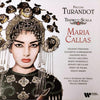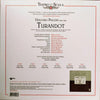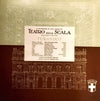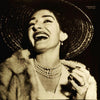







Puccini – Turandot - Maria Callas, Eugenio Fernandi, Elisabeth Schwarzkopf, Tullio Seraphin, Orchestra del Teatro alla Scala di Milano (3LP, Mono, Box set)
Giacomo Puccini – Turandot
Libretto by Giuseppe Adami, Renato Simoni
Princess Turandot - Maria Callas (soprano) [click here to see more vinyl and CD featuring Maria Callas]
Calaf (The unknown prince) - Eugenio Fernandi (tenor)
Liù - Elisabeth Schwarzkopf (soprano)
The Emperor Altoum - Giuseppe Nessi (tenor)
Timur - Nicola Zaccaria (bass)
Ping - Mario Borriello (baritone)
Pang - Renato Ercolani (tenor)
Pong / Prince of Persia - Piero de Palma (tenor)
A mandarin - Giulio Mauri (bass-baritone)
First voice - Elisabetta Fusco (soprano)
Second voice - Pinuccia Perotti (soprano)
Chorus and Orchestra del Teatro alla Scala di Milano
Norberto Mola, chorus master
Tullio Seraphin, conductor
3 LPs, box set with booklet
Original analog Master tape : YES
Heavy Press : 180g
Record color : black
Speed : 33RPM
Size : 12”
Mono
Studio
Record Press : unspecified
Label : Warner Classics
Original Label : Columbia
Recorded 9–13 and 15 July 1957 in the Teatro alla Scala, Milan
Reissue produced by Mark Obert-Thorn
Liner notes by William Fense Weaver
Originally released in 1958
Reissued in September 2023
Tracks:
Side A :
- Act 1: Popolo Di Pekino! (Mandarino, Coro, Liù)
- Act 1: Padre! Mio Padre! (Calaf, Liù, Coro, Timur)
- Act 1: Perduta la Battaglia (Calaf, Liù, Coro, Timur)
- Act 1: Gira la Cote! Gira! (Coro)
- Act 1: Perché Tarda la Luna? (Coro)
- Act 1: LÀ, Sui Monti Dell'est (Coro)
- Act 1: O Giovinetto! (Coro, Calaf)
- Act 1: Figlio, Che Fai? (Timur, Calaf, Liù, Coro)
Side B:
- Act 1: Fermo! Che Fai? T'arresta! (Coro, Calaf, Pong, Pang, Ping)
- Act 1: Silenzio, Ola! (Le Ancelle Di Coro, Calaf)
- Act 1: Guardalo, Pong! (Coro, Timur)
- Act 1: Non Indugiare! (Coro, Pong, Pang, Ping, Calaf, Timur)
- Act 1: Signore, Ascolta! (Liù)
- Act 1: Non Piangere, Liù! (Calaf, Liù, Timur)
- Act 1: Ah! Per L'ultima Volta! (Timur, Liù, Coro, Calaf, Ping)
Side C:
- Act 2: Ola, Pang! Ola, Pong! (Ping, Pong, Pang)
- Act 2: O Cina, O Cina (Ping, Coro, Pong, Pang)
- Act 2: Ho Una Casa Nell'honan (Ping, Pong, Pang, Coro)
- Act 2: O Mondo, Pieno Di Pazzi Innamorati! (Coro, Ping, Pong, Pang)
- Act 2: Addio, Amore! Addio, Razza! (Coro, Pong, Pang, Ping)
- Act 2: Noi Si Sogna (Ping, Pang, Pong, Coro)
- Act 2: Gravi, Enormi Ed Imponenti (Coro)
- Act 2: Un Giuramento Atroce Mi Costringe (Imperatore, Calaf)
- Act 2: Diecimila Anni Al Nostro Imperatore! (Coro)
Side D:
- Act 2: In Questa Reggia (Calaf, Coro)
- Act 2: Straniero, Ascolta! Nella Cupa Notte (Calaf, Coro)
- Act 2: Guizza Al Pari Di Fiamma (Imperatore, Coro, Liù, Calaf)
- Act 2: Gelo Che Ti DÀ Foco (Calaf, Coro)
- Act 2: Gloria, O Vincitore! (Coro)
- Act 2: Figlio Del Cielo! (Emperor, Coro, Calaf)
- Act 2: Tre Enigmi M'hai Proposto! (Calaf, Imperatore)
- Act 2: Ai Tuoi Piedi CI Prostriam (Coro)
Side E :
- Act 3: Così Comanda Turandot (Coro)
- Act 3: Nessum Dorma! (Calaf, Coro)
- Act 3: Tu Ce Guardi Le Stelle (Ping, Pong, Pang, Coro, Calaf)
- Act 3: Principessa Divina! (Ping, Calaf, Liù, Coro)
- Act 3: Quel Nome! (Ping, Liù, Timur, Calaf, Coro, Turandot)
- Act 3: L'amore? - Tanto Amore, Segreto E Inconfessato (Liù, Ping, Calaf, Coro)
Side F:
- Act 3: Tu, Che Di Gel Sei Cinta (Liù, Coro, Calaf, Timur, Ping)
- Act 3: Liù... Bontà! (Timur, Ping, Pang, Pong, Coro)
- Act 3: Principessa Di Morte! (Calaf, Turandot)
- Act 3: Che È Mai Di Me? Perduta! (Calaf, Coro)
- Act 3: "Del Primo Pianto, Si" - La Mia Gloria È Il Tuo Amplesso! (Calaf)
- Act 3: Diecimila Anni Al Nostro Imperatore! (Coro, Turandot)
Reviews
"To have Callas, the most flashing-eyed of all sopranos as Turandot, is—on record at least—the most natural piece of casting. Other sopranos may be comparably icy in their command, but Callas with her totally distinctive tonal range was able to give the fullest possible characterization. With her Turandot was not just an implacable man-hater but a highly provocative female. One quickly reads something of Callas's own underlying vulnerability into such a portrait, its tensions, the element of brittleness. Equally in the final arioso of Alfano's completion, ''Del primo pianto'', the chesty way she sings ''Straniero'' in the opening phrase, addressing Calaf, is unforgettable in its continuing threat. With her the character seems so much more believably complex than with others.
It was sad that, except at the very beginning of her career, she felt unable to sing the role in the opera house, but this 1957 recording is far more valuable than any memory of the past, for me one of the most thrillingly magnetic of all her recorded performances, the more so when Schwarzkopf as Liu provides a comparably characterful and distinctive portrait, far more than a Puccinian 'little woman', sweet and wilting. Even more than usual one regrets that the confrontation between princess and slave is so brief. Though for some Schwarzkopf's observance of markings in Liu's two arias may seem to meticulous, the extra detail reinforces the fine-spun Straussian quality, notably in the rising and falling octaves of ''Signore ascolta''.
Next to such supreme singers it was perhaps cruel of Walter Legge to choose so relatively uncharacterful a tenor as Eugenio Fernandi as Calaf, but at least his timbre is pleasingly distinctive. What fully matches the singing of Callas and Schwarzkopf in its positive charactr is the conducting of Serafin, sometimes surprisingly free—as in the accelerando at the end of Act 1, begun much earlier than the score allows—but in its pacing invariably capturing rare colour, atmosphere and mood as well as dramatic point. The Ping, Pang and Pong episode of Act 2 has rarely sparkled so naturally, the work of a conductor who has known and loved the music in the theatre over a long career.
The conducting is so vivid that the limitations of the 1957 mono sound hardly seem to matter. As the very opening will reveal, the CD transfer makes it satisfyingly full-bodied, far more acceptable than RCA's scrawny stereo sound for the Leinsdorf set. Like so many of Calla's Scala sets the acoustic is on the dry side with solo voices balanced forward, but it avoids the boxiness of—for example—the Manon Lescaut set (EMI Cd CDS7 47393-8, 9/86). The chorus is not always well-served with sound that tends to overload at climaxes, but the propulsion of Serafin's conducting has one readily accepting that. Though with its rich, atmospheric stereo the Mehta set with Sutherland (Decca) remains the best general recommendation, it is thrilling to have this historic document so vividly restored.'” Gramophone
"Puccini’s Turandot was the sixteenth complete opera recording Columbia/Angel made with the Callas and the company of La Scala. Unlike almost every other famous soprano of her day, from Elisabeth Schwarzkopf (1915–2006) to Joan Sutherland [b.1926] and Montserrat Caballé [b.1933], Callas never ventured a contemporary opera; Turandot, first performed in 1926 was the only work she sang in younger than she was herself. Turandot is the perfect vehicle for an ample-sized dramatic soprano with a steady, steely and brilliant voice rising easily to top C. Those of us who saw the truly great Turandot of Birgit Nilsson (1918–2005), will know how ideally it requires a vocal glamour equivalent of a boxer with something of his horse-power. It does not need much in the way of nuance or refinement and no great demands are made on the art of legato and portamento, or in the clean articulation of ornaments. It does not compare with a rôle like Norma, which calls for dramatic accents for far longer stretches, and for a complete mastery of fioritura through every dynamic shading from pianissimo to fortissimo.
In the first two years of her career in Italy Callas appeared as Turandot 21 times. A recorded fragment survives from one of the last performances she sang in 1949 at the Colón, Buenos Aires. She manages the lower passages, which pass back and forth into the chest register, more expressively than Turandots are usually capable of, but she has a whole battery of effects that she cannot employ effectively; all we are conscious of is her singing too strenuously. In the days of her youth when she had to pursue her career without vocal compromises it may have been necessary but as soon as she could, wisely, she dropped it from her repertory. Why she made this recording in 1957 was perhaps because she thought recording it was different from singing it in the theatre and would do her voice no irreparable damage. Nevertheless the following year she seems to have had second thoughts for she told New York radio interviewer Harry Fleetwood, ‘I sang it all over Italy, hoping to God that it wouldn’t wreck my voice. Because... [I]t’s not really very good for the voice…It’s ruined quite a few.’
We note her ability in contrasting her registers and how responsive her voice is across the widest intervals.Tullio Serafin’s tempi are slightly faster than they were in Buenos Aires, so enabling her to relinquish top notes at the end of phrases which threaten to get out of control. Again her subtlety is apparent. In In questa reggia, on the phrase O principi, che o luoghi caravane, as we have noted before, how instinctively she responds to the caravan-like rhythm Puccini suggests in the accompaniment; this is the kind of musical effectiveness that no other Turandot on record shows herself capable of. By this stage of her career she was obviously bothered by the problem of keeping her voice steady. Walter Legge, the producer of the recording, tells how one day at the Biffi Scala he and his wife, Elisabeth Schwarzkopf, who sings Liù, were dining with the Meneghinis, when Callas turned to Schwarzkopf demanding to know ‘how you sing top As and Bs and make a diminuendo on them. Walter says mine make him sea-sick’ Thereupon, much to the astonishment, if not fright, of the waiters and the other diners, she and Schwarzkopf, stood up and began exchanging top notes, and feeling each other in turn, ‘their diaphragms, lower jaws, throats and ribs’. After a bit Callas claimed she had ‘got it’, but perhaps because both singers’ methods were sui generis, she did not effect a cure.
The German soprano Elisabeth Schwarzkopf (1915–2006) studied at the Berlin Hochschule für Musik and later with the soprano Maria Ivogün, making her début as one of the Flowermaidens in Parsifal with the Städtische Oper, Berlin, in 1938. Originally a lyrical soprano she undertook rôles such as Adele in Die Fledermaus, Musetta in La bohème and Zerbinetta in Ariadne auf Naxos when she joined the Vienna State Opera under Karl Böhm in 1943. Her first overseas appearance was with this company on their visit to London in 1947 when she sang Donna Elvira in Don Giovanni and Marzelline in Fidelio. She then joined the fledgling Covent Garden Company, where for five seasons she sang a variety of rôles, mostly in English. Alongside these appearances, Schwarzkopf sang at the Salzburg Festival (1946–1964), La Scala, Milan (1948–1963), San Francisco (1955–1964) and, finally, the Metropolitan in New York in 1964. She was greatly admired in the rôles of the Marschallin, Fiordiligi, the Countess in Le nozze di Figaro and Donna Elvira. Schwarzkopf also created the rôle of Anne Trulove in Stravinsky’s The Rake’s Progress in September 1951. She also had a distinguished parallel career as a Lieder singer she continued to give master-classes and adjudicate in major competitions. A fiercely self-critical artist, Schwarzkopf was extremely demanding of herself and her art. She was the wife of the impresario and recording producer Walter Legge whom she married in 1953, becoming a naturalised British subject. She was created a DBE in 1992.
Eugenio Fernandi (1922–1991) made his operatic début in 1954 in Lisbon as the Duke in Rigoletto. In 1958 he joined the Metropolitan Opera in New York, where he continued to make a series of highly successful performances, after his début there as Pinkerton in Madama Butterfly. It has been suggested that his collaboration in the recording of Turandot with Callas and Schwarzkopf was made at too early a stage in his career, on which it had a deleterious effect.
Born in Athens, after studying at the Conservatory, Nicola Zaccaria (1923–2007), made his début in 1949 as Raimondo in Lucia di Lammermoor. Four years later he appeared at La Scala, Milan, as Sparafucile in Rigoletto. Throughout the 1950s and 1960s he appeared in many leading Italian opera seasons: at Florence, Verona and Rome in the typical Italian repertory. In 1956 he was a guest at the Vienna Staatsoper and at the festival in Salzburg; and in 1957 at Covent Garden with Callas’s Norma he was Oroveso and in 1959 Creon with her Medea. His career was wide and embraced Cologne, Brussels, Ghent, Moscow, Mexico City, Rio de Janeiro, Monte Carlo, Berlin and Dallas, which he returned to often until the 1980s, as well as festivals at Aix-en-Provence, Edinburgh, Orange and Athens. He sang rôles such as Zaccaria in Nabucco, Silva in Ernani, Rodolfo in La sonnambula and Sarastro in Zauberflöte. For EMI he appears with Callas in recordings of Aida, Un ballo in maschera, Il trovatore, La bohème, Il barbiere di Siviglia, La sonnambula and Norma.
Tullio Serafin (1878–1968), born at Rottanova di Cavarzere, near Venice, was one of the great conductors of Italian opera. After studying at the Milan Conservatory at first he was a violinist in the orchestra at La Scala, Milan, then in 1900 at Ferrara began a career as a conductor. Engagements followed in Turin and Rome. Through more than half a century he appeared at Covent Garden, London (1907, 1931, 1959–60), La Scala, Milan (1910–1914, 1917, 1918, 1940, 1946–7), Colón, Buenos Aires (1914, 1919, 1920, 1928, 1937, 1938, 1949, 1951), San Carlo, Naples (1922–3, 1940–1, 1949–58), Metropolitan, New York (1924–34), the Rome Opera (1934–43, 1962), Lyric Opera, Chicago (1955, 1957–58), and numerous other opera houses in Italy and abroad. His repertory was vast. He conducted conventional and unconventional operas as well as introducing a variety of new works and worked with numerous famous singers, including Battistini, Shalyapin, Ponselle, Gigli, Callas and Sutherland. His recording career was exhaustive and embraced the HMV (1939) Verdi Requiem as well as both Angel/Columbia Normas (1954 and 1960) with Callas.” Michael Scott
Rating:
Discogs 4.5 / 5



